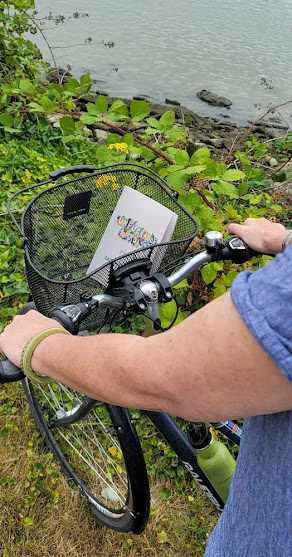Quite possibly, the first poet I met was some local scribe, now made anonymous through the erasing power of time and memory, drafted in by my primary school to spend an hour or two showing disinterested children the magic of words, the kind of work I now find myself occasionally doing. If this even did happen - and it's the kind of thing we do a lot of here in Ireland, because we have a lot of poets desperate for freelance work, and in my experience, teachers will happy push the school to pay for anything that allows them precious time away from their class – I have no recollection of it. We certainly studying poetry, but in primary school, this mainly involved getting the class to paint pictures of scenes from the poems. However, it taught us that words could rhyme with each other, and that was my gateway into poetry, writing silly verse to amuse my friends in class.
It wasn't until my early twenties, a year or two in to university and years removed from nonsense rhyme but still churning out juvenilia, that I even considered seeking out the company of other poets. Poetry was something people wrote in their bedrooms: once in a while you might venture to reveal a page to a friend and seek their opinion, but otherwise, it was a solitary pursuit. Yet somehow, I got wind of a poetry night happening in the city centre. Culturally, poetry didn't exist in Belfast outside of the universities. The idea of a cafe hosting a poetry night, and that people might consider this as a viable form of entertainment for a Friday night, was a radical idea.
Arcadia Coffeehouse existed in a now burnt-out small shopping arcade in the city's Cathedral Quarter, nestled amidst a rotating menagerie of enterprises; tattoo parlour, a second-hand record store, a local crafts shop, the offices of a film festival, and other vaguely bohemian ventures. All small-time operations, all surviving month by month. To get in, we have to bang on the shutter at the back entrance of the arcade. It is not long into the new millennium, but most of Belfast has yet to figure out a thriving nightlife. All the other businesses nearby are shut up for the weekend. Stepping into the coffeehouse however feels homely: Arcadia wasn't like the clinical, mass produced coffee chains we experience how; it had tables with hand-painted designs, mismatched chairs, local art on the walls instead of prints from Ikea, yellow walls that gave the impression of a beach hut rather than an eating establishment.
This is the first time I've ever been to any kind of poetry night, so I have no frame of reference to how it works, what I'm supposed to do, or what people expect. We sit on a sofa that faces out towards the mall passage, and spend the night with our heads turned round, looking over the back at the sofa to the readers, who stand up to read near the counter. The host is Mark Madden, who runs the place with his Canadian wife, Debbie. Immediately, I can see he is everything I how know a host should be: enthusiastic, welcoming, talented, and just a bit mad. At times, his delight in being able to share this space with fellow poets makes his eyes shine, and I can almost imagine him foaming at the mouth in frenzied pleasure. He is my first live experience of a poet in the flesh, and will become a template for my own emceeing aspirations.
When it comes my turn to read, I am nervous: having have a childhood speech impediment, and attended speech therapy classes all throughout primary school, I do not enjoy public speaking. In fact, I hated having to stand up in front of a class in school. So why am I here now? Because poetry somehow has driven me here. I read out my poems from the comfort of the sofa; I face the audience, but I don't get up from my seat – nerves have pinned me down. I read three or four poems, and am thanked by Mark. Afterwards, someone comments that their enjoyed my work, and hoped that I would come back. It is that small compliment that is enough to ensure this new love affair will continue.
I don't remember much about who else read, but patching together dates and memories from other poets, we can identify that poets I still know today, over twenty years later, were in the room that night. So meeting my first poet immediately led to meeting other poets. The next month, I return and read, and Mark generously invites the unknown entity of me to submit to a poster poster project that he is putting together, to be launched at the first ever Cathedral Quarter Arts Festival. I am invited also to read at the festival. Somehow, I am now a public poet. Thank you, Mark.
Colin Dardis is a neurodivergent poet, editor and sound artist. His latest collection is What We Look Like in the Future (Red Wolf Editions, 2022). A pamphlet, With The Lakes, is forthcoming with above/ground press. His latest album is Funerealism (Inner Demons Records, 2022) www.colindardispoet.co.uk




